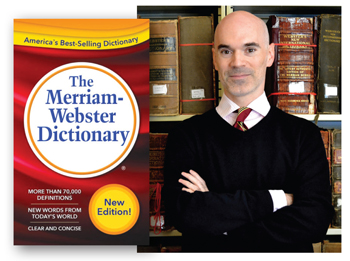Peter Sokolowski: Well Defined | Q&A
Editor Peter Sokolowski on the challenges and rewards of editing the dictionary.
 Editor Peter Sokolowski on the challenges and rewards of editing the dictionary.
Editor Peter Sokolowski on the challenges and rewards of editing the dictionary.
LJ: What led you to Merriam-Webster?
Peter Sokolwski: I didn’t even know that “dictionary editor” was a job. My background was in French literature and philosophy, and I had hoped to become a French professor. Just before starting a PhD program, in 1994, I answered an ad for a French language editor, and it turned out to be the first bilingual project at Merriam-Webster—a small team was hired to make parallel Spanish and French dictionaries. I was told that it would take two years to complete, so I thought it would be an interesting temporary detour from academia. Obviously, I never went back!
How has working for the dictionary changed?
My first assignment was to construct an electronic corpus for French in order to research current usage. Corpus linguistics—digital search of a carefully assembled body of text—is the most important technological development in lexicography. I started at the moment that electronic search began to displace the collection of evidence of a word’s use on little slips of paper, so I experienced that transition.
Now there are huge advances every year, whether it’s putting all of Wikipedia into a single searchable corpus or examining the words used in the letters of Civil War soldiers. It allows us to find linguistic evidence in seconds. When I joined the company, the only computer on the editorial floor was used by the secretary to keep track of pay and vacation time.
What sets Merriam-Webster apart from other dictionaries?
Our history. Noah Webster was a pioneering lexicographer, but after his death [in 1843] the Merriam brothers committed themselves to revising his work and keeping the dictionary current and relevant. It may seem like an obvious thing, but nobody had done that before. Without revision, dictionaries die. The Merriam brothers were the first to use a team of scholars to make an English dictionary for the great edition of 1864, and they became pioneers in evidence-based linguistic research. They recognized that, beyond a name that people recognized and a very big and heavy book, the true authority of a dictionary came from telling the truth about words.
What are the challenges of editing a dictionary definition?
Ideally, you want to explicitly include all the probable uses of a word without excluding the possible ones. It can sometimes end up feeling like a philosophical exercise; it’s art as much as science. For example, we used the word wholesome in the definition of dad joke, and I think that helps isolate the particular kind of joke we are talking about. Jokes can also be mean, so by using wholesome we add context.
You’ve played a major role in the dictionary’s social media presence.
Because our online dictionary data tells us which words are spiking at a given moment, some tweets are essentially responses to questions that we are being asked by the public. When many people were looking up precedent and unprecedented, we knew why—and we tweeted that unpresidented isn’t a word in our dictionary. The important thing is that we are being ourselves—our voice on Twitter reflects who we are and what we do.
Over the years, what kind of feedback have you gotten?
We get lots of letters! And email. People have strong feelings about language, and rightly so. We often get questions about how a word gets into the dictionary. Some people write to suggest improvements. I answered a sequence of letters from a man in prison about French grammar, because he was teaching himself French using our dictionary. With Twitter, we can engage with folks who care about language, and they discover that there are real people behind the dictionary.
We’re seeing debate about language, such as the singular they. What other discussions will play out?
History gives us perspective. You was only a plural pronoun for centuries, just as they has been. Today, using thee and thou is much more remarkable than using singular they—which has been in use for centuries alongside its plural meaning. Related pronouns like themself will take a bit longer, but social forces can and do drive changes in language or usage. That’s always been the case. The most controversial word entered in our 1961 Unabridged edition was finalize. It’s hard to imagine opposing its use today.
RELATED
ALREADY A SUBSCRIBER? LOG IN
We are currently offering this content for free. Sign up now to activate your personal profile, where you can save articles for future viewing









Add Comment :-
Comment Policy:
Comment should not be empty !!!